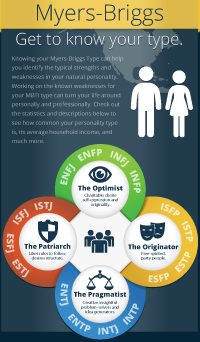Career Tips for INFP Personality Types (Introverted-Intuitive-Feeling-Perceiving).
Depending upon one’s Myers-Briggs Type Indicator® (MBTI®) Personality Type, each type will approach the career exploration process differently based on this natural personality function. The Myers-Briggs Type Indicator® provides key insights into personality and professional strengths that can help organize an occupational search and help narrow career options. This assessment can trace its origins to the theory of psychological personality types developed by Carl Jung, one of the founders of modern psychology. The Myers-Briggs® Test classifies individuals into 16 different personality types based on a range of characteristics. The 16 different combinations of the following four dichotomies make up the 16 types. These are: Introversion or Extraversion, Intuition or Sensing, Thinking or Feeling, and Judging or Perceiving. This assessment was developed by Isabel Myers and Katharine Briggs to identify connections between personality features and those of occupations, pairing an individual with those who are like minded. Using this tool for occupation selection, and the four components of the career exploration process (goal setting, gathering information, networking, and decision making) can be one of the most successful ways to obtain happiness and permanence in a career.
INFP Personality Types (Introverted-Intuitive-Feeling-Perceiving) and Career Choice.
Two examples of occupational directions which INFPs have an inclination to pursue tend to show ambition in the language, visual, and performing arts or occupations which involve a form of courtesy to others, either assisting or educating them with physical or emotional difficulties. These commonalities among career choice are based on an INFPs innate sense of purpose and creativity. Some occupations an INFP may hold are Musician, Writer, Graphic Designer, Psychiatrist, Audiovisual Specialist, Broadcast Technician, Craft Artist, Film or Video Editor, Fine Artist, Food Preparation Worker, Maids and Housekeeping Cleaners, Occupational Therapist, Proofreader or Copyeditor, or Technical Writer. Most prefer to deviate from environments with excessive structure or rules which do not allow for their flexible, innovative personality. Typically, creativity holds the most weight when factoring an ideal job for an INFP, and their nurturing, optimistic compassion creates the need for their chosen career to enhance their livelihood. INFP personality types often have the ability to adapt to unpredictable environments and are always looking for potentialities of growth. These individuals are sensitive, concerned, and caring and are usually fascinated with the opportune moment to explore the complexities of the mind (both their own, and other’s).

Read about The Myers-Briggs® Test INFP Personality Type Career Tips and other Occupational Information
Possessing the strength of persuasion, this type of person is driven by perception and typically draws on their personal principles and values to determine their decisions and associations. This perceptive intuition, as well as, warmth and sympathy, also generate masterful interpersonal relations, even though some may find them difficult to understand. INFPs curiosity and flexibility shape them into catalysts for capitalizing on the implementation of their innovation. Their depth of concentration and understanding of communication will be attractive qualities to prospective employers. This personality type is loyal to their values and attach importance to a balanced work and home structure. INFPs have a firm grasp of how possibility can bring them opportunity and use this future-forward thinking when progressing their career options to the goal setting phase of the exploratory process.
INFP Personality Types Goal Setting and Gathering Information.
The first step to the career exploration process is to set clear objectives to obtain the position desired. As a destiny driven individual, an INFP will start by making multiple long-term quixotic goals but may have no discernable practicality of lasting direction for achievement of such. Justifying specific necessities in order to achieve each goal will be beneficial for this personality type. Having these specific destinations will allow for an option to be preferred among the opportunities. INFPs also have the innate gift of the ability to utilize unanticipated possibilities, but often they wait for the “perfect job” instead of taking identifiable actions to supplement previously defined goals. A tool for an INFP to examine is to assess each goal on a timeline, with added specific needs leading up to obtaining the objective. The visual representation of specific ventures required will enable an INFP to choose among alternative options and remain focused. The following step is to gather information. An INFP will find it in their nature to investigate occupational projections and to read about current opportunities within their goal set. Their innovative personality will search with an aim of an occupation allowing for possibilities of development and education. When gathering information, INFP personality types have a tendency to compare too many possible courses of action and may become overwhelmed. In doing so, pertinent information needed to make a knowledgeable decision may be neglected. A tool which can be helpful for this type of personality, is to create a shortlist of the opportunities anticipated and narrow this inventory to the top five which are most appealing. In order to reduce this list, compare the positions to personal priorities. This tool should be used prior to completing the timeline of goals. Also, visiting an online career resource to ensure varied information sourcing can be constructive as well. Importantly, reaching out to experts within the field desired can offer valuable incite into the day-to-day operations and assist with any additional information gathering required.

Read about The Myers-Briggs® Test INFP Personality Type Career Tips and other Occupational Information
INFP Personality Types and Networking.
Networking for Introverted Personality Types can be challenging as their opposition to reach out to experts is simply an innate behavior. However, choosing to avoid this step of the career exploration process may result in lost opportunities. When INFPs do begin to network, this type of person will find it easy to come across as an innovative collaborator. They will also accentuate their quick learning capacity and aptitude. It will be common for INFP personality types to only contact mindfully selected professionals or to not reach out to experts at all. One reason for this behavior, is due to an INFP wanting to build relationships based on trustworthiness, depth, true interconnection, and mutual growth. For a person with hesitance, it can be helpful to begin a networking campaign with close friends and family who can introduce contacts built over the course of their careers. These close relations can also help an INFP practice interview questions prior to career turning points. Practicing with others can assist this personality type to gain confidence, raise their voice, and make a realization for themselves what their strong-points are. INFPs tend to emphasize potentialities and possibilities focusing on their potential contribution but should remember to also state their current strengths and to reiterate how significant their skills and education can be applied immediately. Also, remembering that the interviewer may be a part of an opposite personality dichotomy will also be useful. For example, INFPs should highlight their ability to carry out specific tasks and produce tangible results when speaking to a Thinking Personality Type interviewer and to not confound a Sensing interviewer with too many eventualities. Finding information related to how different personalities react is a helpful tool when interviewing and during pre-interview network endeavors, and using this knowledge can lead to a multitude of offers.
INFP Personality types and Decision-Making.
As opportunities begin to present themselves, an INFP must make a career choice. This step of the career exploration process can be daunting for this personality type. Often, they will be susceptible to delaying their decision. An INFP will approach this step by utilizing an impartial progression, centered around their loved ones, finding it challenging to make a decision due to manipulation of these relationships. This is caused by what consideration of other’s wants instead of their own needs. This personality type abides by moral commitments, making decisions based on what they believe to be crucial. A tool for INFPs to utilize during this process is to create a cause and effect chart. This system allows an INFP to systematically consider the consequences of each opportunity by displaying how each will effect their own life. For example, if an offer is received which requires a lengthy commute, the effect will display the cost for travel or vehicle maintenance, and hours taken from personal downtime, which may not be beneficial if the original cause for new employment was to spend time with others. At times, this personality type might not consider the logical repercussions of each opportunity presented and having this chart will assist with an educated decision. When making this chart, an INFP may ignore information which is actually unmanageable for them, so it is important to list as many cause and effect situations as possible. Another way for an INFP to speed their decision-making process is to set a deadline to which a decision must be executed and have the ability to not stray from that self-imposed deadline. This date should be one which was set during the goal setting phase of the process and should allow enough time for each step in the period proceeding. Many INFP personality types have found that disclosing this “Decision Date” to family and friends can be a helpful way to see it through. Writing it down in an area which is seen daily can also be a helpful way to ensure a decision is made in a timely fashion. Most importantly, confidence in the decision made will improve career choice longevity and overall happiness. A Myers-Briggs Type Indicator® (MBTI®) Assessment completion and knowing personality commonalities within particular dichotomies, can help guide the career exploration process by being aware of inherent behaviors and less preferred functions which can lead to potential obstacles. This information can help secure occupational success where an INFP can use their gifts and be appreciated for their contributions.
Learn More About the MBTI INFP Personality Type
Explore additional information that delves deeper into the INFP Personality Type by examining various personality and career based subjects:
- How the MBTI INFP Type relates to Innovation
- How the MBTI INFP Type relates to Project Management
- How the MBTI INFP Type relates to Emotional Intelligence
- How the MBTI INFP Type relates to Leadership
- How the MBTI INFP Type relates to Decision Making
- How the MBTI INFP Deals with Changes
Click on a link below to read more about different MBTI Personality Types
| ISTJ | ISFJ | INFJ | INTJ | ESTP | ESFP | ENFP | ENTP |
| ISTP | ISFP | INFP | INTP | ESTJ | ESFJ | ENFJ | ENTJ |
References
Introduction to Type (Isabel Briggs Myers, 1998, CPP Inc.)
Introduction to Type and Careers (Allen L. Hammer, 2007, CPP Inc.)


